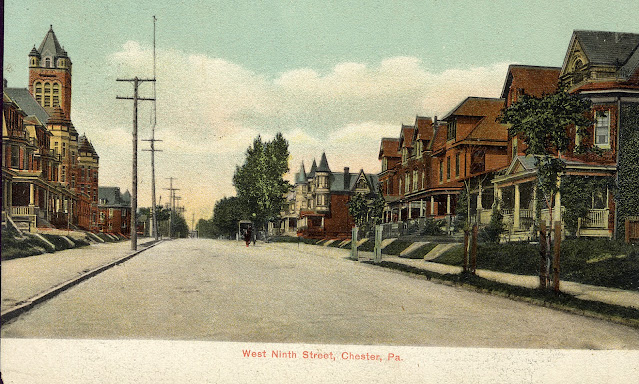A Chester postcard from about 1920. The card shows West Ninth St. and the old Chester High School on the far left. Ninth St. was a street everyone wanted to live on.
Note: This article is from the Chester Times date unknown but probably from the 1920's. Delaware County was growing by leaps and bounds and this article talks about Delco "Customs" that were disappearing. Customs dating back to when Delco was mostly farms and had traveling salesman. Please read a fun look back.
SOME VANISHING CUSTOMS
In days gone by, one of the sure signs
of approaching spring, along with the sound of frogs croaking in the marshes,
and the sight of children jumping rope and playing marbles, was the appearance
of the organ grinder with his monkey. He
was a jolly, good-natured man who traveled on foot along city streets and
country roads, stopping now and then to grind out a few lively tunes on the
organ which he carried, strapped to his back.
He was a picturesque figure, dressed in rather shabby clothing, but his
gay, red vest and the feather in his hat gave him a dressed-up air.
Perched on top of the organ or sitting
on his master’s shoulder, was the organ-grinder’s monkey, dressed in a little
red suit and wearing a round, red at.
Around his neck was a leather collar to which a long, thin chain was
attached.
When the music began, people came out
of their houses to listen, and children came running from every direction to
dance and skip to the gay tunes, or to watch the monkey perform his little
tricks. When the show came to an end and
the audience applauded, the monkey would make a bow, take off his cap, then
walk around holding it out for the pennies and nickels people gave him to carry
to the organ grinder.
In the days before trolleys, buses, and
automobiles made traveling easy, the organ grinder was just one of the people
who went on foot from house to house, trying to make a living by selling
something or performing a service for a small fee. There was the Banana Man, for instance, who
carried on one shoulder a great, heavy basket filled with ripe bananas, laid
between layers of clean, dry hay to keep them from being bruised. These he sold for a penny apiece, or ten
cents a dozen.
There were other peddlers who carried
their stock in a basket or rolled up in a pack to be carried on the back. They offered an assortment of household
needs, such as needles, thread, buttons, pins, calico and other dress goods,
handkerchiefs, and small kitchen utensils.
People depended on the peddlers because stores were far apart,
especially in the farming country.
Another familiar figure in days gone by
was the Scissors Grinder. His grindstone
was set in a wooden frame which he carried on his back as he trudged along,
ringing a large handbell and shouting “Scissors to grind! Scissors and knives!” If any one came out with something to
sharpen, he would quickly slip out of the straps that held the grindstone to
his back, sharpen what was handed to him, collect the money, and hurry away.
The Umbrella Mender was another
itinerant workman who went from house to house in city and country. He carried a pack on his b ack which
contained his tools and some old umbrellas and spare parts to be used in making
repairs. In one hand he carried the
small lamp which he used to heat his soldering iron. A good umbrella mender was always busy,
because an umbrella was a family possession that was expected to last for many
years and repairing one required skill.
Sometimes an umbrella man would mend holes in tin utensils. This was a very useful part of his trade, for
tin pots and pans and the big tin wash boilers in use did not wear as well or
last as long as the iron utensils they replaced.
The tin ware salesman carried on a
flourishing trade in the latter half of the 1800’s, as can be learned from
diaries and correspondence of that period.
The Tin Peddler, as he was called, carried his stock of tin pots and
pans in small, light wagon with a top, drawn by an old horse. The tin ware was hung all over the frame of
the wagon and the clatter of pots and pans could be heard long before the team
came into view. The tin peddler was a
welcome visitor, and was especially popular with the women, because he brought
to the remote farms and villages the shiny tin ware that was so much easier to
handle than the heavy iron pots and kettles that had been used for many
years. Like all itinerant tradesmen, he
brought the news he had gathered in his travels, which was a great treat to
people who had no telephones, no daily newspapers, and no radio sets.
The disappearance of these traveling
tradesmen has been gradual, brought about by building developments, better
transportation, and a host of inventions.
Perhaps they may still be seen in country more remote than Delaware
County is now.

It was way uptown for the entire Delaware county ! Once a beautiful place !
ReplyDeleteWhen I was a kid/teenager we loved shopping in downtown Chester. I was a great place. It's so sad to see what it has become.
ReplyDelete